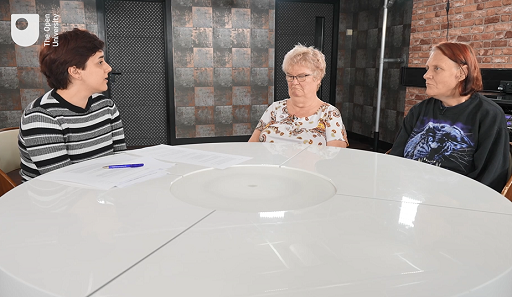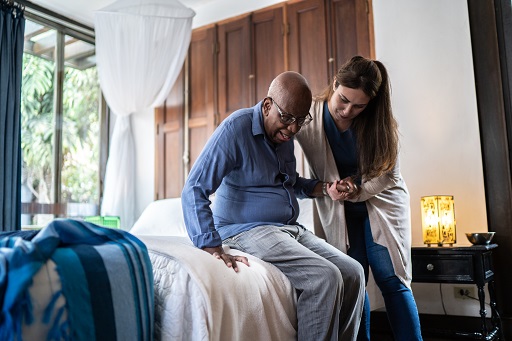2 Getting older with a learning disability
As the life expectancy of people with learning disabilities has increased, there has been growing interest in how to support people well in older age. In previous years most older people with learning disabilities would have been living with families or in residential care. But increasingly people live in more independent arrangements as they age, for example, in supported living, or in their own home with support (Tilley et al., 2023).
Wherever people are living as they get older, they have a right to person-centred support. Commissioners, service providers and practitioners should all be thinking about what this means. How can people be supported to feel well and safe as they age? How can people be supported to plan for the changes that come with growing older? How should support be adapted to respond to these changes?
It is also important to think about the specific challenges that might face older people with learning disabilities who have at times displayed behaviours of concern. Some people with learning disabilities may demonstrate behaviours that challenge others for the first time as they get older, perhaps due to the onset of a new health condition, such as dementia. In our research, we defined ‘older’ as 40+ for people with learning disabilities to reflect the early onset of some chronic health conditions for this population.
Activity 3 Ageing and behaviours that may challenge others
Can you think of up to three specific challenges that people with learning disabilities and behaviour that challenges others might face as they get older?
Watch the panel talking about their answers to this question.

Transcript
LISA: What might be some specific challenges for their families as their person grows older? What might be some thoughts that go through their heads?
PAM: I think it’s finding the right support for the loved ones because as they’re older then they pass away or something, then the families need to find that right support for the loved ones to move into before they leave.
LISA: So that they can be sure that their family members are happy--
PAM: And cared for, yeah
LISA: --and living the life that they want.
DAWN: Yeah.
LISA: Because I suppose they’re worried that they’re not going to be there to do those things, to make those decisions for that person. And Dawn, can you think of any other challenges?
DAWN: Well, obviously get a care plan in place so when they move they know what they’re doing.
GAIL: So I think it’s particularly important when people get older that we are looking for those health changes. Because as people get older, I mean, I know myself you get more aches and pains, things happen, health gets-- it’s something that, poor health it can affect anyone at any age. But as you get older, there’s more of a likelihood that that’s going to so why wouldn’t that be the same for people with learning disabilities?
And thankfully now people with learning disabilities are living long enough for us to see some of those changes. It’s not as good as it could be and people are still dying too young, but actually there are people living longer. Because the only way some people have to communicate is by their behaviour. It’s by lashing out and hitting someone if they’re cross or hurt or angry or upset. Or it’s pushing someone away if they just want to be left alone because they’re not feeling very well. It can be so basic.
Particularly as people get older, just be more mindful. Women with a learning disability going through menopause, blimey, we all struggle with that. We’re only just getting to grips with how people without a learning disability cope with all the symptoms that there are with menopause.
We’ve only just started talking about it for the general population of women. Let’s please, if we’re having these conversations about menopause, please think about people with a learning disability as well and how they would make sense of some of those changes which can be horrific, depression, and all sorts of horrible side effects that can happen during that time.
And it doesn’t just start, as we were always told when I was young, it doesn’t just start in your 50s. Menopause can start in your 40s. It can start earlier. So be aware that it’s not always down to the person’s learning disability. They have health needs the same as everybody else. We shouldn’t need to say that, but it seems that we do. Because I still hear there’s a term used diagnostic overshadowing, I think is the term.
And we’ve seen that through LeDeR, through all of the reports on people who’ve-- people have looked at the learning disability, assumed their behaviour was just because they’ve got a learning disability, and they’re being difficult, and forgetting about all those other things and not saying, well, actually, they’re a human being here, and this human being might have something that’s bothering them. Let’s check. Let’s do some checks.
BEN: The withdrawal thing I’ve seen personally before. And then when you find families in these situations and you try to engage with them, they don’t want to engage. They’ve had enough of engaging. And these people and their families are tired. They’re tired of having to-- they’ve fought and fought and fought, and sometimes they’ve not been listened to all.
Sometimes they’ve been heard a little bit, and something’s been done, and it’s almost like dangling a carrot. And then something happens, and then it’s withdrawn. And I think it’s a real, real shame, and I think it’s something that really does need addressing within the system. So diagnostic overshadowing is a biggie. It’s not necessarily very well understood by the whole system. I should clarify when I say system, I actually, for all intents and purposes, mean health and social care.
One anecdote, one example I can give from my personal practice is, again-- I was a community nurse and a phone call from a residential home of a chap that I was supporting. Friday afternoon, 4 o’clock, absolutely panicked that this gentleman was exhibiting quite aggressive physical behaviours both towards himself and staff members. It had come out of nowhere.
And he was an elderly gentleman, and they were convinced that he was experiencing some sort of rapid mental health decline. So I went to visit. This gentleman was very, very distressed. And I’d never seen him like this before at all, and I’d worked with him for quite a number of years.
But I didn’t want to lean towards the mental health side of things. And what became apparent through discussion and looking through the records of the residential home was that, actually, the long and short of it was that this chap had a UTI, a urinary tract infection. And it was quite easily spotted once you brought all the paperwork and discussion together.
And the outcome of that was that we got an emergency appointment with the GP who came out to visit. We got some antibiotics. And whilst the behaviours remained for a day or so, we put a plan in place, and he was he was able to be supported successfully without having to go into an assessment and treatment unit. And once those antibiotics kicked in, he was absolutely fine.
And I think one of the things I would stress about diagnostic overshadowing, behaviours that challenge, is that we really need to be listening to the experts, who are the people themselves and their families. So if I had a family member telling me that their son or daughter was behaving in a way that was completely not them, I wouldn’t just go, well, they’ve just got-- it’s their learning disability. You listen to the people. You wouldn’t just brush families and people off. You’d listen to what they’ve got to tell you, and then take it further from there.
Discussion
The three challenges that our panel members drew attention to were:
- There is a need to ensure the person has a care plan in place that looks to the future and anticipates specific changes that may occur, for example, a family member becoming ill, or dying.
- Our panel highlighted the importance of identifying and responding to age related health changes (e.g. women with learning disabilities going through the menopause). Sometimes a person’s behaviours can be an indicator that the person is unwell or experiencing a health-related change (for example, in the case of the UTI that was discussed). The panel also emphasised the risks of diagnostic overshadowing, which is when a person’s behaviour is incorrectly attributed to their learning disability (or to their history of so-called ‘challenging behaviour’) and thus a critical opportunity to identify a potential symptom of ill-health is missed.
- Ben Briggs also drew attention to people and their families becoming fatigued by the system as they get older. After years of advocating for the right support, people may simply run out of physical and emotional energy to keep fighting. Practitioners must be alert to this and recognise when the person and their family carers may have unmet needs.
As the previous activity has shown, the way someone is behaving may indicate a health related change as they get older. The label of challenging behaviour can also lead inadvertently to diagnostic overshadowing, where a symptom is missed because of incorrect assumptions about the person’s behaviour.

